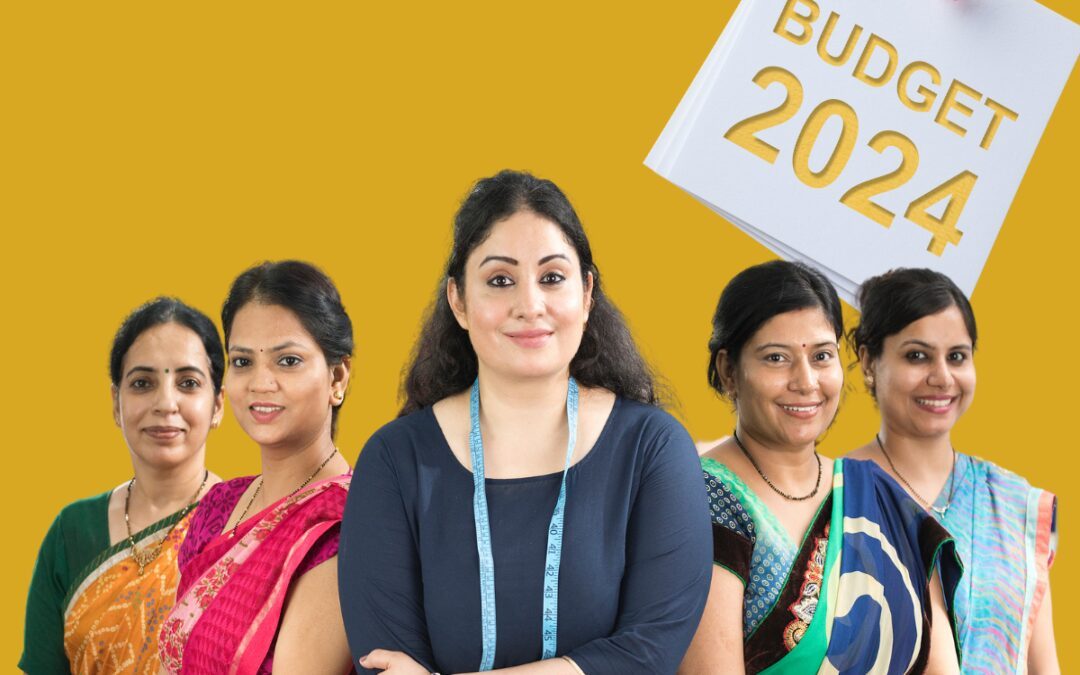Union Budget 2024: India is making strides on global platforms ranging from local production boost to attracting foreign companies to shifting supply chains from rival China as it harbors dreams of becoming the third largest economy. The women of modern India have largely breached the patriarchal walls and are joining the workforce at a moment when Bharat is also seeing a paradigm developmental shift.
Read our full Budget 2024 coverage here
In today’s Narendra Modi-government-led India, the Nehruvian philosophy of asserting the condition of a nation by looking at the status of its women is still true and perhaps it will forever be valid. World Bank data shows India’s female labour force participation rate was 19.2% in 2021, contributing 17% of the country’s gross domestic product (GDP), which is relatively low for a nation dreaming of becoming a $5 trillion economy by 2025.
The International Monetary Fund (IMF) stated that achieving gender equality in India, meaning equal participation of women in the labor force as men, could potentially elevate India’s GDP by 27%. According to the World Bank, Indian women contribute to the economy at 17% of GDP, which is less than half of the global average. If approximately 50% of women could join the workforce, India might increase its growth by 1.5 percentage points, reaching 9% annually.
Industrialist Kumar Mangalam Birla recently pitched for increased involvement of women in economic activities, highlighting its potential to significantly boost India’s growth. Vouching for India’s need for a “double engine” of growth, Birla, chairman of the Aditya Birla Group, highlighted the crucial role women could play in the country’s economy.
The upcoming Budget will thus need to work towards gender parity and also work on schemes to uplift the lives of women in Bharat that is seeking to be one of the strongest forces in the world.
“There is a great importance of women-centric budget measures since women make up 40-50 percent of the population, and more and more women are joining the workforce. Firstly, skill training programs specifically for women and young girls must be planned. Right after class 12, vocational training in nursing, handicrafts, etc, should be on the agenda; a budget needs to account for that,” says Joita Sen, Director and head of Marketing and Design at Senco Gold and Diamonds
India’s Interim Budget will be announced on February 1 by a woman – Nirmala Sitharaman in what will be her sixth Budget. Finance Minister Sitharaman has previously said that women are likely to feature heavily in the upcoming interim Budget, indicating she is expected to address a myriad of issues, particularly affecting women, ahead of the general elections set to be held later in 2024.
Among others, Budget’s area of focus is expected to be the women of India, with more and more women entering the workforce in recent years.
“Empowering women through budgetary measures is not just a matter of equality but a strategic imperative for economic growth. The inclusion and upliftment of women in the workforce contribute significantly to a nation’s economic development. Women bring diverse perspectives, skills, and innovation to the table, fostering a more robust and dynamic economy,” says Vaishali Gupta, Co-founder & Chief Growth Officer, mCaffeine.
Also Read| Vote on Account before the vote: Will new freebies find a place in it?
Women in workforce
The female labour force participation rate climbed to 24% in Q2FY24 from 23.2% in the previous quarter and 21.7% in Q2FY23, according to government data released in November.
“Another noteworthy trend is the emergence of the second generation of women entrepreneurs, with daughters of billionaires and leaders of Fortune 500 companies stepping into leadership roles to shape the business world. The increase in women investors has brought diverse perspectives in decision making,” says says Anju Gupta, President & Co-Founder, IvyCamp
“Recent reports show that women-led startups in India’s tech industry have grown by 8% among the funded companies. These startups saw a 76% year-on-year increase in early-stage funding in 2022 as compared to a 9% increase in the startup ecosystem,” Gupta adds.
Meanwhile, retirement fund body Employees’ Provident Fund Organization (EPFO) recorded a net new women subscribers addition of 28,69,688 in FY23 against 15,93,614 in 2019-20, showing a rise in employment through the pandemic.
These numbers will only increase as more women graduate and join the workforce in the coming years. According to a report from Oxford Economics, the number of women working in urban areas is also increasing thanks to greater access and better transport options.
“We estimate that greater access to ride-hailing services, which make transport more inclusive for women, could boost the number of women in the workforces of Bengaluru, Chennai, Delhi, Kolkata and Mumbai by between 3.7% and 6.5% by 2028, over and above the natural growth in the size of the population,” the Oxford Economics report, commissioned by Uber, noted.
“Investments in healthcare, education, and affordable childcare facilities will play a pivotal role in enabling more women to actively participate in the workforce. By prioritizing these areas, the Budget can create an environment that nurtures the potential of women, unlocking a powerful force for India’s economic advancement. It’s time to recognize and leverage the transformative impact that women-centric policies can have on the nation’s prosperity,” mCaffeine’s Gupta adds.
This perhaps suggests the need for Budget 2024 to ensure safe and easy travel options.
Multiple state governments are providing free bus rides for women in their respective states. These include the Congress-ruled states of Karnataka and Telangana as well as the Aam Aadmi Party governed Delhi.
According to the Centre, over half of the accounts under the Pradhan Mantri Jan Dhan Yojana (PMJDY) – launched in 2014 – belong to women. The government’s flagship scheme for financial inclusion now has over 51 crore accounts, of which 56% are estimated to be womens’ accounts.
India recently became the most populous country in the world, surpassing China, with the country’s gender ratio improving over the years, rising from 904 in 2019 to 1020 in 2023, with women surpassing men for the first time.
The Union Budget for 2023, presented in February, this year, saw a gender budget outlay of 4.95% of the total expenditure, which is marginally higher than the previous year’s initial budget estimate (4.33%).
However, it must be noted that this increase is still lower than the revised estimate for last year (when the gender budget accounted for 5.21% of total expenditure) as well as actual expenditure back in 2021-22 (at 5.52%).
Also Read| How Interim Budget can propel India’s ambitions to become the third-largest economy
What the Budget can do for women
Taking into account the rapid rise of women in the Indian economy, the interim Budget will likely have to place emphasis on its outlay for women, especially in light of the increasing populace and gender ratio.
“A startup for women initiative at the SME and MSME levels needs to be supported by special government plans. As a member of the jewellery industry, special EMI plans and easier options to buy gold and diamonds through credit cards or consumer financial products could be crucial since jewellery is ‘streedhan’ for the future of women,” Senco’s Sen added.
India has made strides in women’s empowerment. Still, the sixth economic census by the Ministry of Statistics and Programme Implementation revealed only 13.76% of entrepreneurs are women, totaling 8.05 million out of 58.5 million. Despite notable male leaders like Satya Nadella, Sundar Pichai, Laxman Narasimhan, and Shantanu Narayen on the global stage, the proportion of women in top corporate positions raises questions about fair representation.
“Addressing the gender pay gap and ensuring equal opportunities will not only enhance the socio-economic status of women but also lead to a more inclusive and sustainable economic growth,” says mCaffeine’s Gupta.
India has been providing support to women entrepreneurs through schemes such as Pradhan Mantri Mudra Yojana, Women Entrepreneurship Platform (by Niti Aayog), and Mahila Udyam Nidhi Scheme (by SIDBI), among others.
“We are optimistic about the upcoming budget continuing the commitment to gender inclusivity. Women’s representation in technical fields has seen a boost with institutions like IITs reserving 20% of seats, promoting gender equality and fostering more women in entrepreneurship,” adds IvyCamp’s Anju Gupta.
However, experts suggest a minute portion of state and central schemes offer mentoring or networking as the main support area.
“Developments show positive impacts of recent policies and at the same time offer a unique opportunity for the government to take this momentum into overdrive in the upcoming budget. We anticipate stronger government support for incubator cells, women entrepreneurs in tier 2 and 3 cities, and women’s networking groups. This support would create a more conducive and supportive environment for women’s entrepreneurship in India,” IvyCamp’s Anju Gupta explains.
Sonal Jaitly, Global Lead, Gender Equality and Social Inclusion (GESI), MSC, had said in a media article that while 71% of central and 96% of state schemes directly support entrepreneurs or businesses, a mere 7% of central and state schemes exclusively serve female beneficiaries.
The budget will thus need to address those areas and Jaitly said aligning both central and state initiatives can effectively tackle financial aspects, mentorship, guidance, market connections, and advanced support services.
Budget FAQs
What is the female labor force participation rate in India?
The female labor force participation rate in India was 19.2% in 2021.
How much does India’s female labor force contribute to the GDP?
India’s female labor force contributes 17% to the country’s GDP.
What was the gender budget outlay in the previous year’s budget?
The previous year’s budget had a gender budget outlay of 5.21% of total expenditure.
What percentage of central and state schemes exclusively serve female beneficiaries?
A mere 7% of central and state schemes exclusively serve female beneficiaries according to Sonal Jaitly, Global Lead, Gender Equality and Social Inclusion (GESI), MSC.










